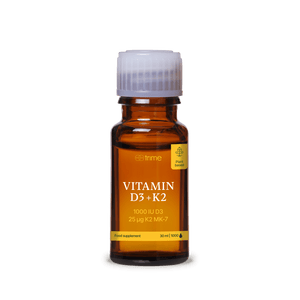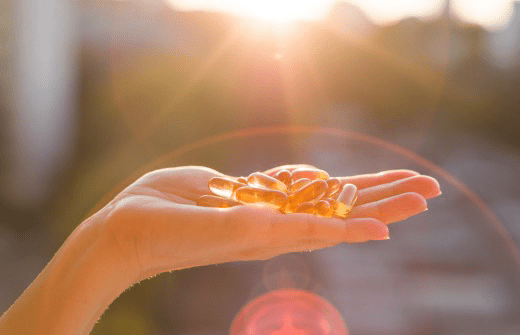Summer is the time of year when we spend more time outside and we are exposed to sunlight more often. Unfortunately, sun exposure and UV radiation can also lead to faster skin aging, causing wrinkles and pigment spots. The rising temperature also influences our body. The body has to keep the stability of the internal environment, maintain a steady internal temperature and maintain a balance of minerals depleted by sweating. In this article, you will find an overview of the most important supplements that can help to support our health even during the summer and holidays.
Article at a glanc:
- Why is it important to think about supporting immunity in the summer?
- The importance of multivitamins in the summer months
- Which supplements have an anti-aging effect?
- What are the benefits of vitamin C during summer?
- How is sweating related to magnesium deficiency?
- Is it appropriate to take vitamin D in summer?
Why is it important to think about supporting immunity in the summer?
Although colds, flus and viruses that cause these infections are more common in autumn and winter, it is advisable to think about immunity during the summer as well. A strong immune system can help us avoid unpleasant sickness and gastrointestinal problems that we often meet on travels. Nutrition plays a very important role in maintaining a healthy immune system, also as an exercise and quality sleep. However, we can also support immunity and its proper functioning with suitable supplements.
The importance of multivitamins in the summer months
In the summer we travel more, so it can easily happen that we lose our routine and eating habits. We usually eat more in restaurants and sometimes we skip meals. We don't have control over our diet and food can be more unhealthy. That is why it is so important to take a good multivitamin that helps provide our health and provide nutrients our body needs on a daily basis.
Which supplements have an anti-aging effect?
During the summer months, when our skin is more exposed to sunlight, it is recommended to include more carotenoids and antioxidants to the diet. Ultraviolet (UV) radiation causes oxidative stress and cellular damage and antioxidants can neutralize free radicals and provide natural protection for skin. Therefore, in the summer or during trips to warm regions we can eat fresh colorful fruits and vegetables full of nutrients and compounds with many benefits to our health. Many of these compounds naturally found in plant foods are usually added to cosmetic products or nutritional supplements because of regenerative and anti-aging properties. Our product Trime ProLife contains the carotenoid astaxanthin, which has a positive effect on the skin confirmed by a number of studies and other health benefits are still under research. ProLife also contains natural full-spectrum vitamin E, which helps protect cells from oxidative stress.
What are the benefits of vitamin C during summer?
Vitamin C is an important nutrient with a number of functions in the body. During the summer, when our skin needs support, we also should think about sufficient intake. Vitamin C is an antioxidant that can provide protection from harmful UV radiation. It also helps to build and maintain collagen, as its production decreases with age. By supporting collagen synthesis, vitamin C maintains the normal condition of the skin and promotes faster healing.
Vitamin C also plays a key role in maintaining a healthy immune system, which can help reduce the risk of travelers' intestinal distress. Numerous studies showed that vitamin C can prevent and alleviate viral and bacterial infections and shorten the duration of illness.
Antihistamine effects are also attributed to vitamin C. Histamine is a substance produced in the human body. It forms part of the body's defense system and mediates allergic reaction. We can therefore also use it for seasonal allergic reactions, such as hay fever.
How is sweating related to magnesium deficiency?
As the air temperature rises, some of us deal with increased sweating. It can be uncomfortable in some situations. But sweating is a natural way that serves to regulate body temperature and remove harmful substances from the body. Unfortunately, during sweating, some minerals are also excreted excessively, for example magnesium. Magnesium is an important intracellular mineral that participates in more than 300 biochemical reactions in the body. It acts as an activator of many enzymes and is necessary for energy production. Across the population, magnesium is classified as a deficient element, and it is estimated that Czechs take in about 20% less than the recommended daily dose. Some of the symptoms of its deficiency include muscle spasms, eyelid twitching, fatigue, insomnia or a general state of restlessness and discomfort. Therefore, if you experience any of the above symptoms, you are exposed to chronic stress or you regularly exercise, you should use magnesium supplement.
Is it appropriate to take vitamin D in summer?
You might think that there is no need to supplement vitamin D in the summer, as we synthesize it naturally after sun exposure. However, if we spend most of our time indoors and we are not in direct sunlight for at least 10-15 minutes a day between 10-15 o'clock (people with darker skin up to 30 minutes), we are not getting enough vitamin D. Also, if we use sunscreen creams with a protection factor of 30 or more, we prevent our skin not only from possible skin burns, but also vitamin D synthesis. The best way to find out is a blood test. If we are low on vitamin D, then supplementation also during the summer is recommended. Ideally combine together with vitamin K2, because they work synergistically.



















